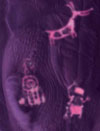ROCKDRILL 8: VIA | SURREALISM'S BAD RAP
ROCKDRILL 8: VIA Caroline Bergvall Optic Nerve/Carcanet (£14.95) SURREALISM'S BAD RAP Garrett Caples Narrow House Recordings ($12) by Christine Hume "Here is the great secret:"

ROCKDRILL 8: VIA Caroline Bergvall Optic Nerve/Carcanet (£14.95) SURREALISM'S BAD RAP Garrett Caples Narrow House Recordings ($12) by Christine Hume "Here is the great secret:"
André Gregory Theater Communications Group (13.95) by Justin Maxwell André Gregory's Bone Songs is a layered, melancholic work driven by its language. The publication of the play
edited by Alan Michael Parker Tupelo Press ($19.95) by Stephen Burt Is a poet we read in translation in some sense a fake poet, or
Clark Coolidge by Noah Eli Gordon Drawing from the lexicon of sexualized international intrigue, Clark Coolidge's Bond Sonnets (available as a free PDF download here) was originally
Jerome Rothenberg Ahadada Books ($12.95) by Lucas Klein In his monumental essay "Paz in Asia," Eliot Weinberger chronicles the great modernist poets and translators who
LIFE LINE AS A SKYSCRAPER Ioana Ieronim GOOGLE ME! Saviana Stănescu BALKAN APHRODITE Nicolae Tzone translated by Sean Cotter and Ioana Ieronim THE MARCH TO
Graham Foust Flood Editions ($12.95) by Chris McCreary Graham Foust's third collection, Necessary Stranger, begins with "1984," a poem whose very title brings with it a

Noah Eli Gordon, Vinea Press, Jerome Rothenberg, André Gregory, and more... INTERVIEWS Reconsidering the World: An Interview with Noah Eli Gordon Interviewed by Joshua Marie Wilkinson